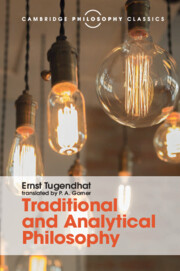Preface
Published online by Cambridge University Press: 05 August 2016
Summary
In so-called analytical or language-analytical philosophy there is little reflection on its own foundations, and today less than before. For the most part the problems treated are inherited problems which are not questioned. Partly this is due to a lack of historical consciousness. A way of philosophizing can only become a fundamental philosophical position by confronting it with earlier conceptions of philosophy. This reflection on foundations is not just an additional act of self-clarification. It is a condition of a philosophy's ability to perceive the task that has always been the genuinely philosophical task: the examination of existing questions, methods and basic concepts, and the development of new ones.
These lectures aim to provide an impetus in this direction. They therefore have the character of an introduction. By means of a confrontation with traditional philosophy's fundamental orientation to the subject-object schema they attempt to bring questions which already exist in analytical philosophy into the context of a specifically language-analytical fundamental question. As regards content, they move in a field of investigation that is by no means new; and even in this field they take only a first step.
The book is directed at three different groups of readers. The reader whom it addresses directly in the form of lectures is the philosophical beginner, for whom it could serve as an introduction to the philosophical way of thinking. At the same time it is directed, if only in an oblique way, at the reader who is already well-versed in linguistic analysis. Above all, however, it is directed at those who, being more or less familiar with traditional philosophical modes of conception, miss in analytical philosophy a fundamental question which can be compared with the great traditional approaches. This book seeks to build a bridge for such readers, by trying to show that analytical philosophy contains a fundamental question which can not only compare with the traditional approaches but actually proves to be superior to them.
This aim is a reflection of my own development, which started out from Heidegger and led to language-analytical philosophy. I became convinced that Heidegger's question about the understanding of ‘Being’ can only acquire a concrete and realizable meaning within the framework of a language-analytical philosophy.
- Type
- Chapter
- Information
- Traditional and Analytical PhilosophyLectures on the Philosophy of Language, pp. xi - xiiPublisher: Cambridge University PressPrint publication year: 2016

